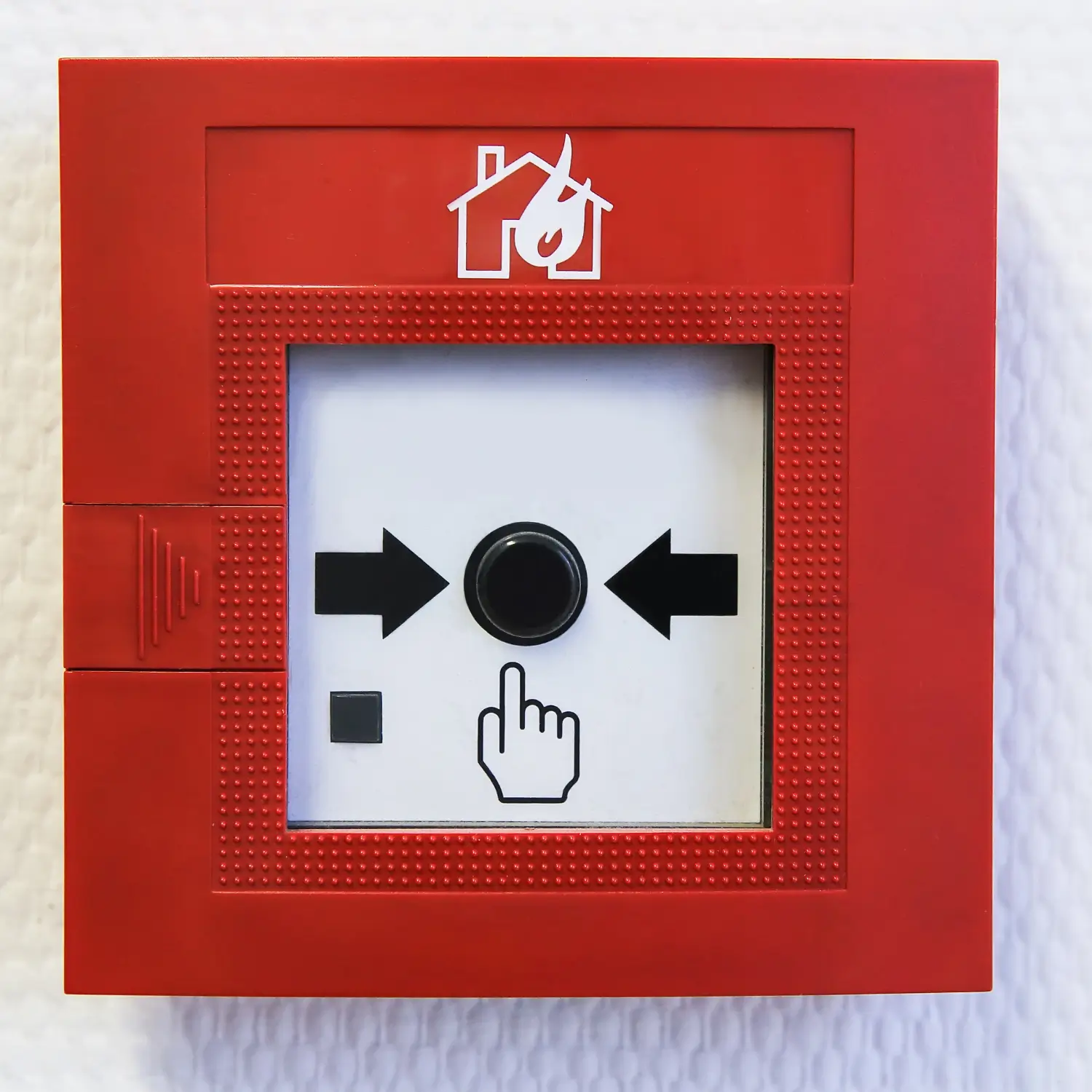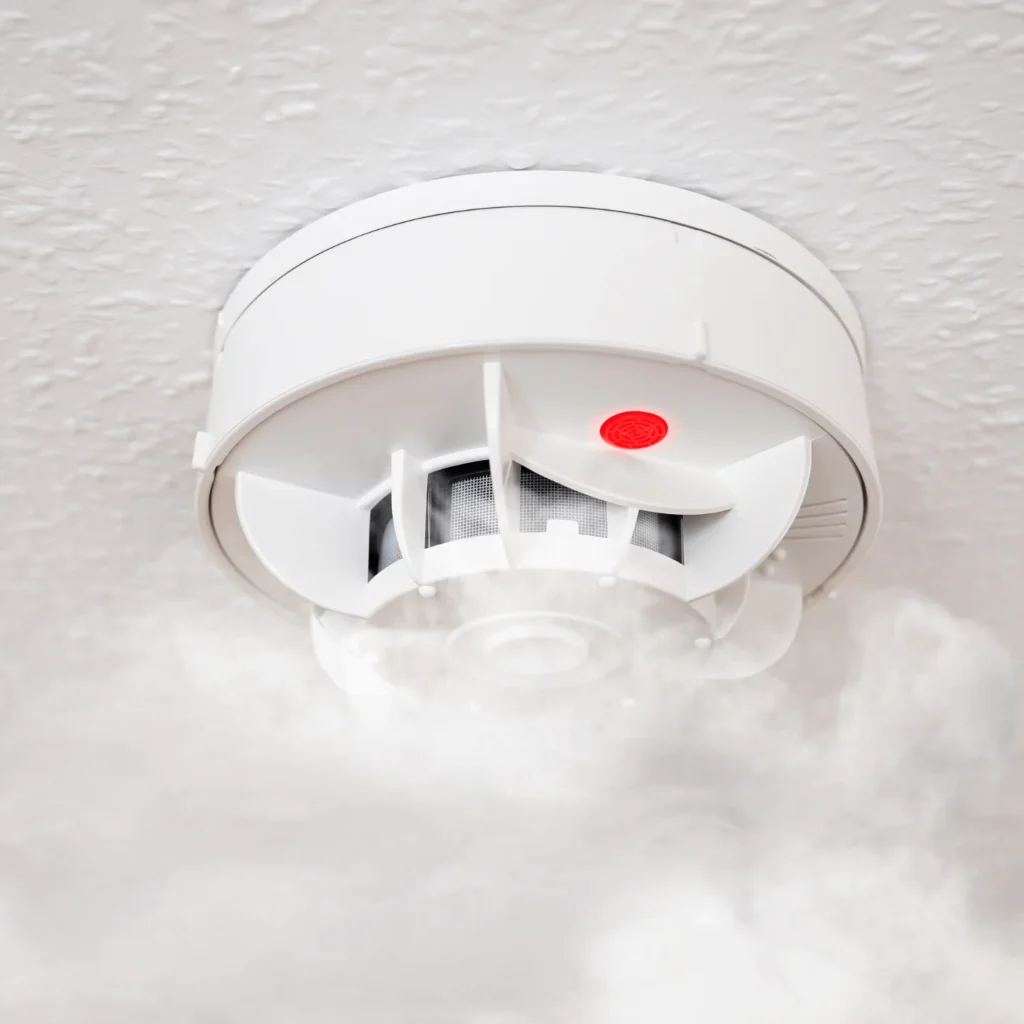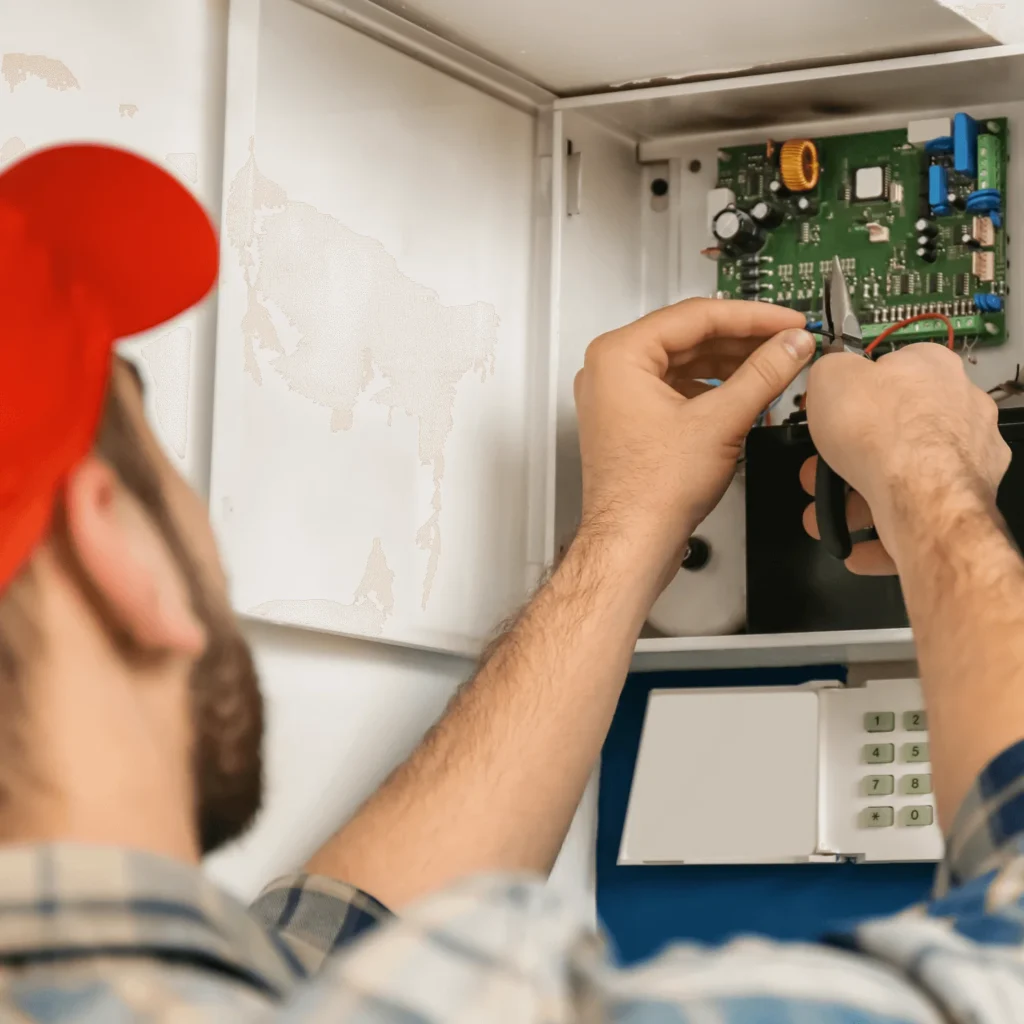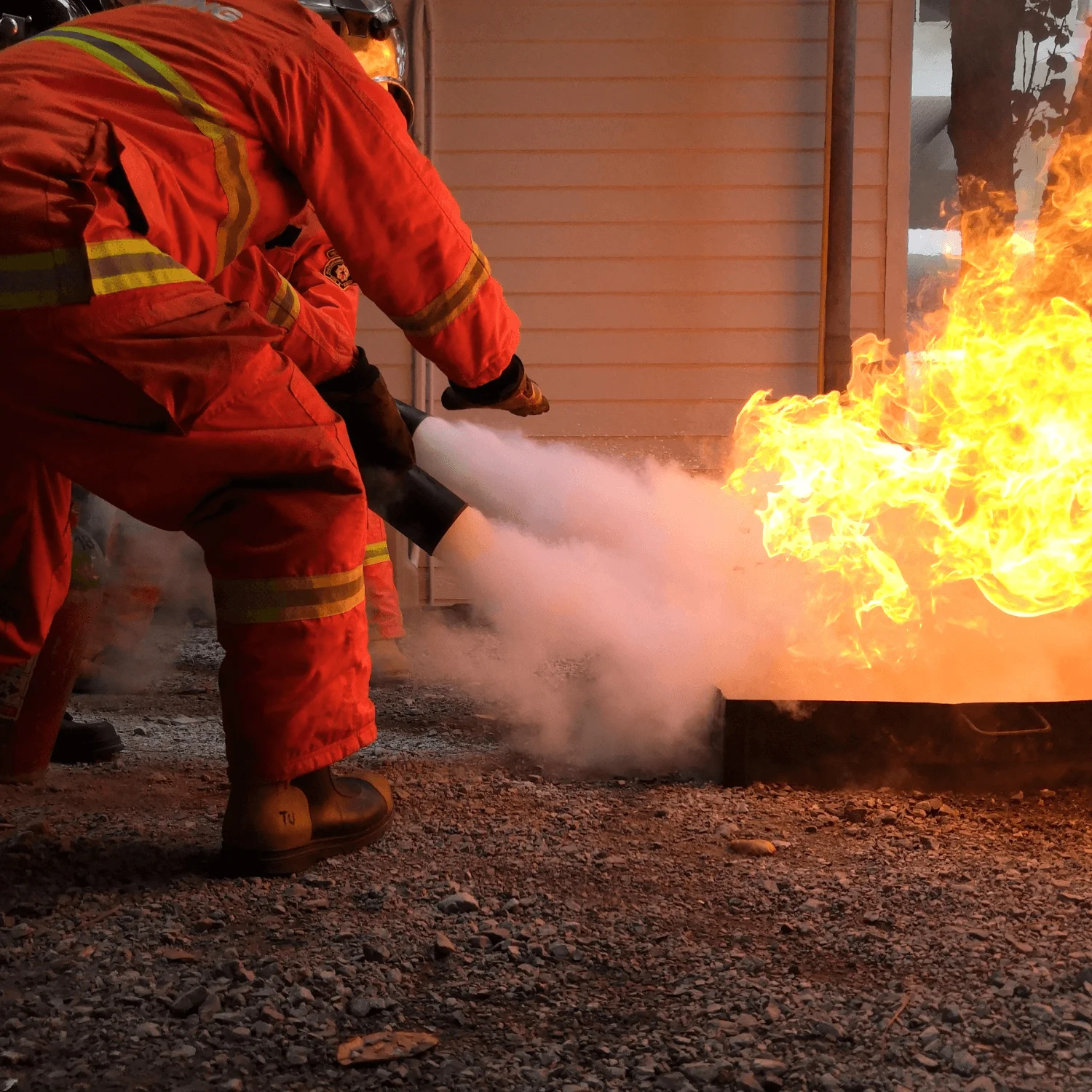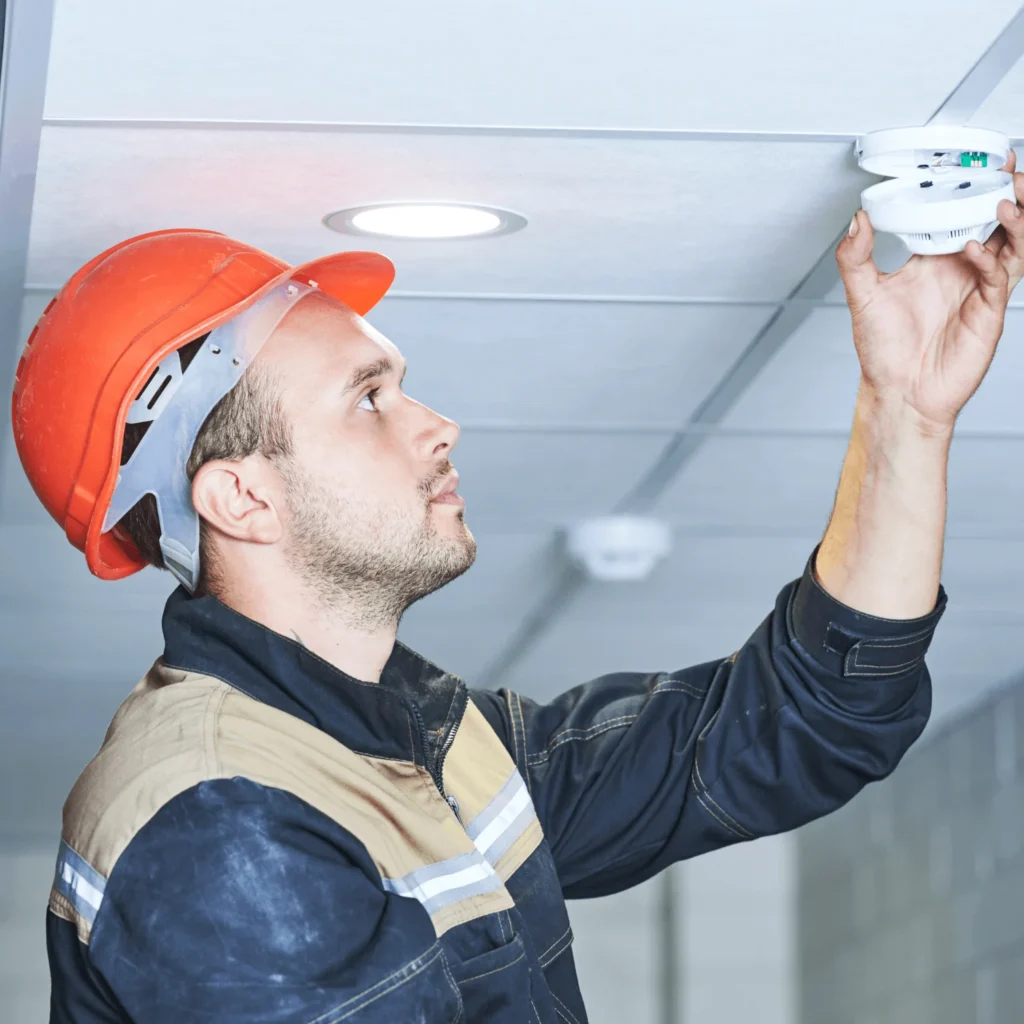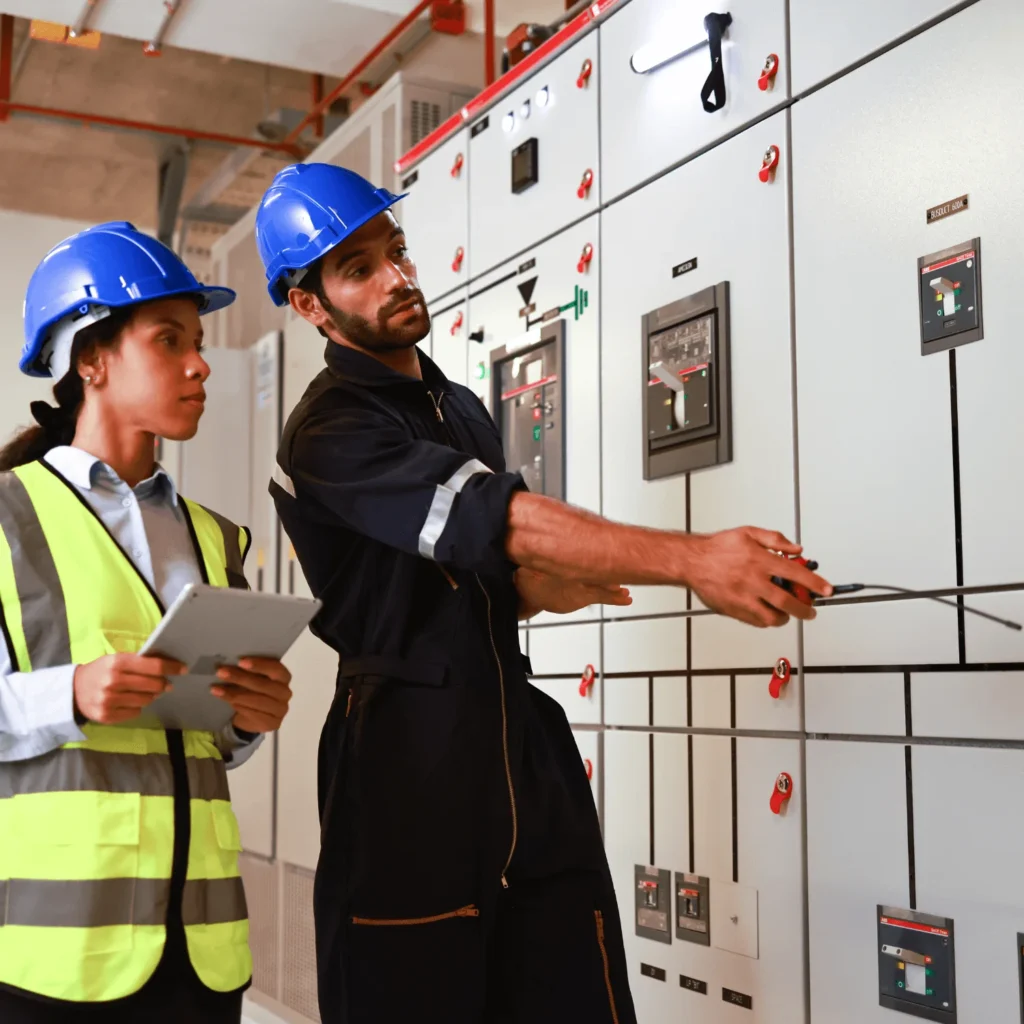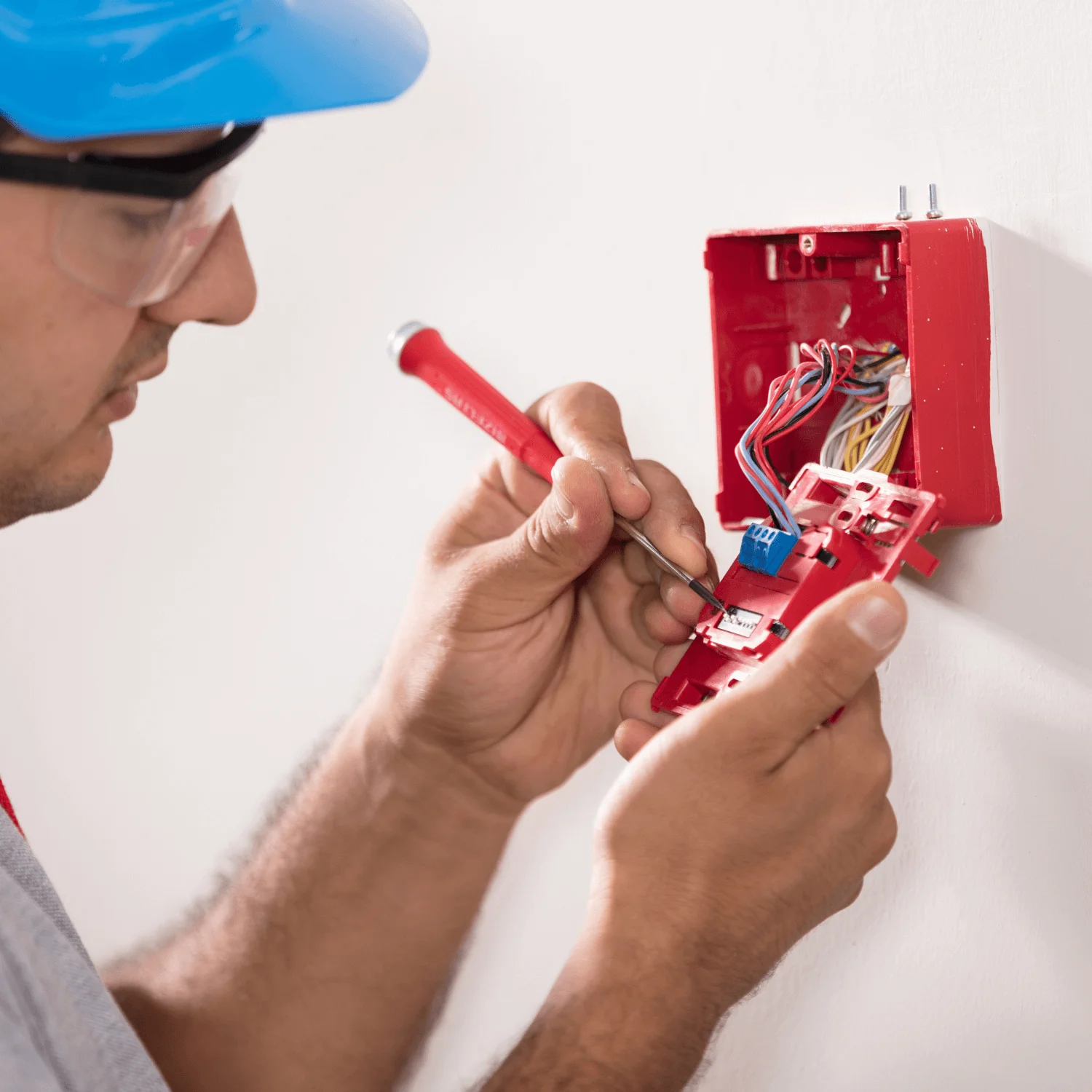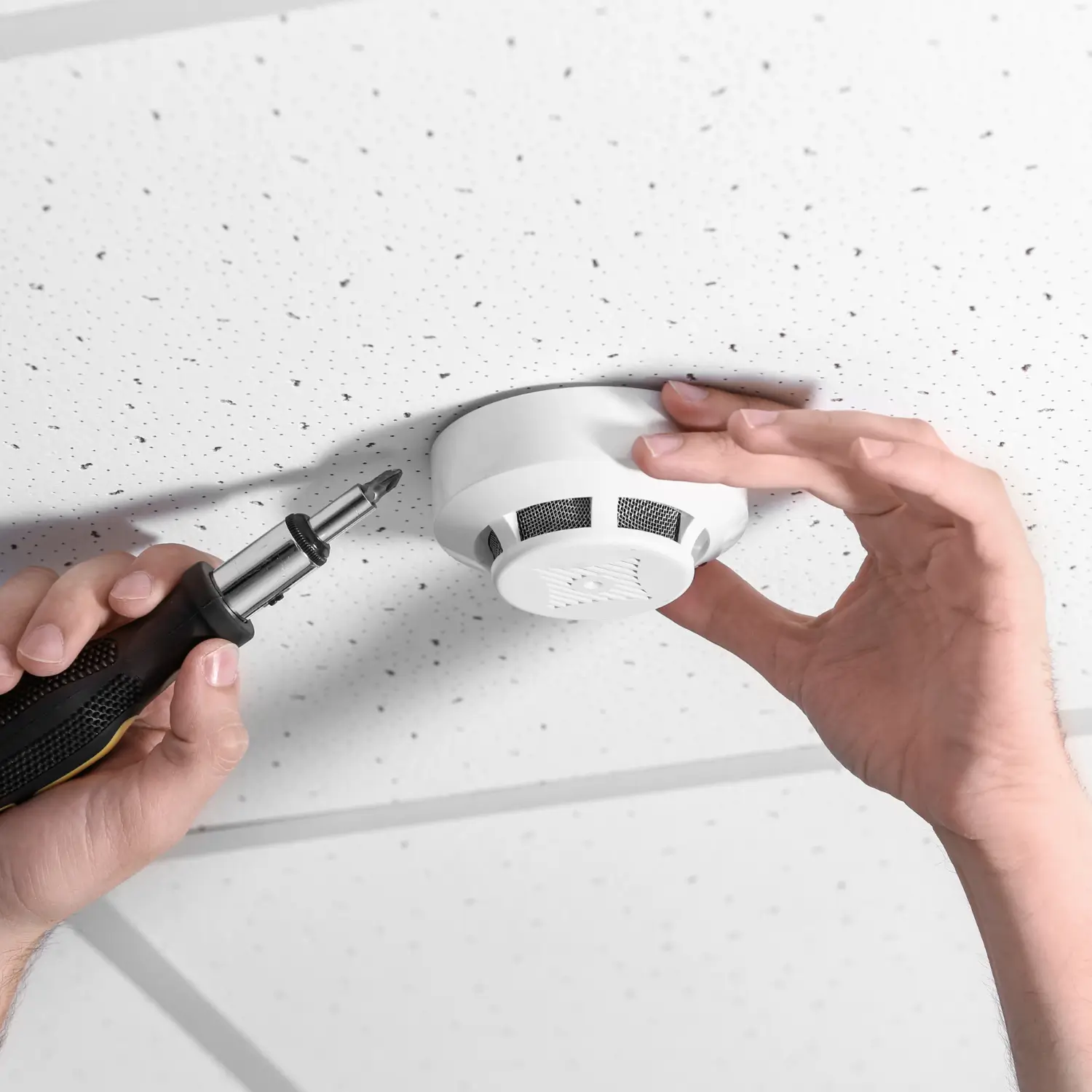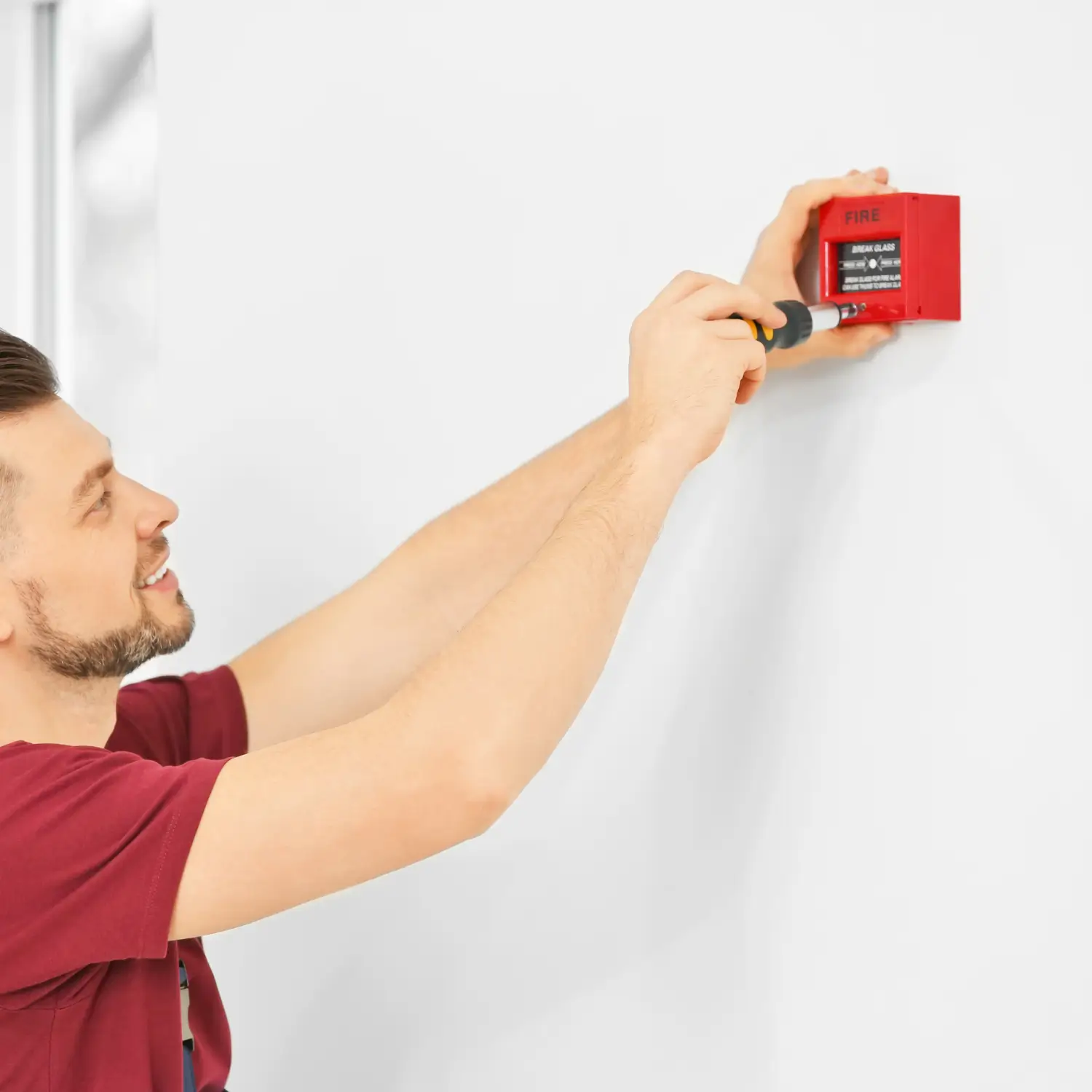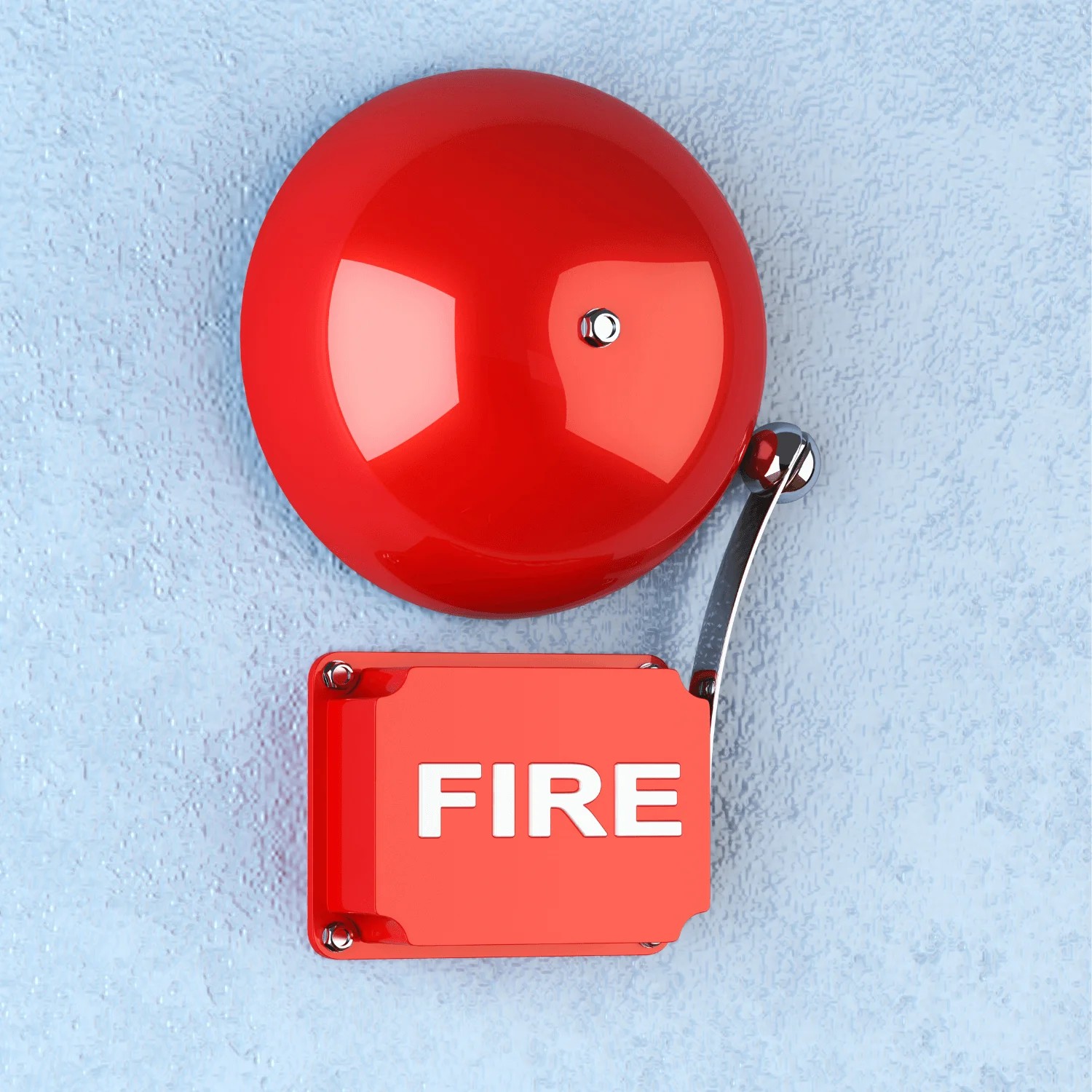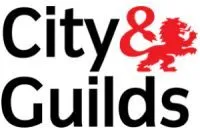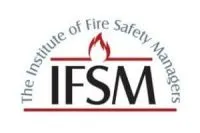Safeguarding West London with Expert Fire Alarm Solutions
Ensure your safety with the London Safety Certificate today. Experience unparalleled service and compliance from our dedicated professionals. Contact us for a consultation and secure your peace of mind with our trusted fire alarm systems.
ONLY £180
* All inclusive (No hidden Cost)
* Limited time offer upto 2 weeks from now
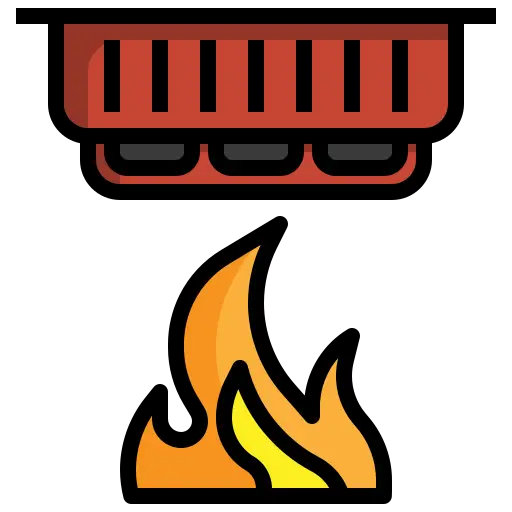
Fire Alarm Solutions in West London by London Safety Certificate
When considering fire alarm systems in West London, you’ll need to navigate the UK’s rigorous Building Regulations, specifically Part B for fire safety. This includes weekly fire alarm tests and annual inspections by accredited technicians to ensure compliance with the Regulatory Reform (Fire Safety) Order 2005. Options range from conventional to smart technology systems, with considerations for building size and existing structures influencing the choice between wired and wireless setups. Advanced systems provide benefits like early detection, real-time monitoring, and integration with other safety systems crucial for residential and commercial properties. By exploring further, you’ll unveil a wealth of specifics on installation processes, costs, and innovative technologies available.
London Safety Certificate specialises in providing expert fire alarm solutions across West London, catering to the needs of both commercial and residential properties. With over 12 years of industry experience, the business prides itself on delivering quick and reliable services, ensuring safety without compromising quality. Their team of professional technicians is adept at installing and maintaining cutting-edge fire alarm systems tailored to meet specific safety requirements. Emphasising customer satisfaction, London Safety Certificate offers reasonable pricing and is celebrated for its responsiveness and innovative approach to fire safety, as evidenced by its consistent 5-star customer reviews.
Fire Alarm Installation Price
£180
✔ IFSM Approved Contractor
✔ Accordance with BS5389
✔ Professional Installers
✔ 10 Years Experience

HOW CAN WE HELP
At London Safety Certificate, we specialise in providing top-tier fire alarm systems tailored to meet the specific safety requirements of residences and businesses throughout West London. Our commitment to reliability, innovation, and responsiveness ensures that each client receives a cutting-edge solution that offers maximum protection against fire hazards. By leveraging the latest fire detection and alarm system technology, we equip our customers with the tools necessary to ensure rapid response times and effective emergency management. Our dedicated team of experts is always ready to assist with installation, maintenance, and any urgent fire safety needs, making London Safety Certificate a trusted partner in safeguarding your premises against fire risks.

WHY US
When it comes to ensuring the safety and compliance of your premises in West London, choosing the ‘London Safety Certificate’ for your fire alarm needs is the prudent choice. With over 12 years of dedicated industry experience, our professional technicians are adept at delivering quick and efficient services without compromising quality or safety. We pride ourselves on our reliability, innovation, and responsiveness, consistently receiving 5-star reviews for our exceptional service and transparent pricing. At ‘London Safety Certificate,’ we not only meet the standard expectations for fire safety but exceed them, ensuring that each solution is tailored to the unique needs of our clients. Trust us to protect what matters most to you with our top-tier fire alarm solutions.
Understanding of Fire Alarm System Installation in West London
In West London, installing a fire alarm system requires a thorough understanding of legal regulations and technical specifications. You must navigate local regulations that dictate where and how alarms should be installed. These guidelines ensure your installation meets safety standards and is optimised for effective emergency response.
You must select equipment that aligns with the latest advancements. Opt for systems with user-friendly interfaces, enabling swift monitoring and control. This is crucial in ensuring all occupants can easily understand and use the system in an emergency.
Installation best practices involve careful planning and precise execution. You’ll want to work with certified professionals following National Fire Protection Association (NFPA) standards. They’ll help you strategically place sensors and alarms to cover all critical areas without leaving blind spots.
System maintenance tips are vital for reliability. Regular alarm testing procedures should be established to check system functionality. This includes scheduled inspections and immediate repairs to fix or replace faulty components.
Monitoring services also offer added benefits, allowing 24/7 surveillance and quicker dispatch of emergency services.
Emergency response planning goes hand in hand with fire safety training. All building occupants should be trained to react when an alarm sounds, facilitated by clear and accessible alarm interfaces and regular drills.
Book NowWhat Types of Fire Alarms are Available?
Explore the various fire alarms available to enhance your safety in West London. As you delve into the options, you’ll find that each system offers unique features tailored to different needs and environments.
Firstly, conventional systems are widely used in smaller properties. These systems segment the building into zones, with detectors and alarms wired back to a central control panel. The panel identifies the zone but not the specific device triggered in an activation.
In contrast, addressable alarms provide precise information, pinpointing the exact device activated. This system is invaluable in large buildings where immediate location identification is crucial. Each device has a unique address, and the system reports back to the panel, facilitating swift action.
Wireless systems
Offer flexibility and ease of installation, eliminating the need for extensive wiring. These systems communicate through radiofrequency, a perfect solution for historical buildings where wiring can be obtrusive.
Smart technology
Integrates fire alarms with other home automation systems. This technology allows you to monitor and control your system remotely through mobile applications.
Interlinked devices
Enhance this functionality by connecting all alarms, so when one triggers, all sounds significantly improve reaction time.
For detection, you have smoke detectors, heat alarms, and carbon monoxide detectors.
Multi-sensor detectors
Combine several sensing elements, like smoke and heat, reducing false alarms and increasing reliability.
Manual alarms
Such as break glass units, allow individuals to activate the system manually, ensuring immediate alert to all occupants.
Each type of fire alarm system in West London offers distinct advantages. It is tailored to different building layouts and user needs, ensuring comprehensive protection against fire hazards.
Benefits of Advanced Fire Alarms Systems
Understanding the various types of fire alarms available can significantly inform your decision when choosing the right system for your property in West London. Advanced fire alarm systems, integrating smart technology and wireless alarms, offer substantial benefits regarding fire safety and system reliability. These systems excel in early detection, a critical factor in differentiating between minor damage and catastrophic loss.
Smart technology in fire alarms allows for real-time monitoring and automatic adjustments based on the environment, enhancing smoke detection capabilities. This responsiveness can swiftly activate an emergency response, drastically reducing response times and potentially saving lives.
Moreover, these advanced systems are designed with intuitive user training interfaces, ensuring you’re equipped to handle the system effectively.
Wireless alarms provide a streamlined installation process that eliminates the need for extensive wiring, reducing installation costs and time. Their flexibility in placement also enhances smoke detection coverage, offering a more comprehensive safety net across your property.
Advanced fire alarms simplify maintenance. Many systems have self-diagnostic features that alert users to malfunctions and maintenance needs, ensuring continuous operational reliability.
This proactive maintenance approach extends the lifespan of your alarm system and ensures it’s functioning optimally when you need it most.
Book nowChoosing the Right Fire Alarm
When selecting the appropriate fire alarm for your West London property, consider both the layout of your premises and the specific fire risks associated with your environment.
To ensure residential safety and commercial compliance, you’ll need to weigh various fire alarm features. Start by assessing the smoke detector types available; opt for photoelectric detectors in areas prone to smouldering fires or ionisation types for quick-flaming areas.
Understanding system maintenance is crucial. Regular checks are essential to ensure functionality, especially in systems with complex setups like wireless technology.
While this technology enhances ease of installation and expandability, it requires diligent maintenance to prevent failure during critical times.
Moreover, consider the environmental impact of your chosen system. To align with sustainable practices, opt for alarms that feature eco-friendly components and minimal energy consumption.
Alarm monitoring services are also paramount; they ensure that any fire incident is immediately reported to emergency services, expediting response times and enhancing emergency preparedness.
User training must be considered. Ensure that the occupants of your building are well-trained in alarm system operations.
This includes regular drills and educational sessions on emergency preparedness to minimise panic and mishandling during an actual fire event.
To cap it all, choosing the right fire alarm is about balancing cutting-edge technology and practical usability, ensuring all-around safety while adhering to regulatory standards.
Tailor your selection to the unique needs of your West London property for optimal protection and compliance.
Book nowInstallation Process Overview
Typically, installing your fire alarm system begins with a certified technician’s detailed assessment of your premises. This is crucial to tailoring the system to your needs and adhering to stringent safety regulations. Technicians will evaluate factors such as building layout and existing wiring infrastructure, determining the optimal placement for detectors and alarms.
Subsequently, the chosen fire alarm technology is installed. You’ll choose between wired and wireless fire alarms with distinct installation challenges and features. Wireless systems, for instance, offer easier installation and less disruption but may require more frequent maintenance checks to ensure their battery life and functionality.
System testing is an imperative step post-installation. This ensures that all components function in unison and comply with safety standards. The installation timeline can vary, typically stretching from a few days to several weeks, depending on the complexity of your system and the ease of access to installation sites.
Lastly, understanding maintenance procedures is essential to keep your system operational. Regular checks and tests are necessary to preempt failures and ensure continuous protection.
Here’s a quick overview of key installation aspects:
Installation Time
Varies based on system complexity and premises size
Key Challenges
Adapting to existing structures, wiring integration
Maintenance Frequency
Bi-annual checks are recommended for optimal performance
Whether you opt for professional installation or consider a DIY installation, grasp the complexity and responsibility involved. Mastery of fire alarm systems enhances safety and ensures compliance with ongoing technological and regulatory standards.
Integration With Other Safety Systems
Integrating your fire alarm system with other safety systems significantly enhances your premises’ security and responsiveness in emergencies.
System interoperability is crucial. It allows fire alarms to communicate seamlessly with other safety mechanisms, such as CCTV, access controls, and hazardous gas detectors. This unified approach streamlines emergency response and fortifies risk assessment capabilities.
To achieve this, you’ll need to ensure equipment compatibility across systems. All components must interact without malfunction or delay in alarm notifications, which is critical during an emergency.
Monitoring solutions that offer centralised control and real-time data integration enhance your ability to manage and respond to incidents swiftly and effectively.
Adhering to safety protocols and regulatory compliance can’t be overstated. Each integrated system must meet specific standards that govern its installation and functionality. This ensures the safety of occupants and legal protection for your business.
Regular user training is imperative to maintaining system efficiency and responsiveness. Your staff should be well-versed in operating the integrated systems and understand their individual and collective roles in emergencies.
Book nowLegal Requirements in West London
You must comply with specific legal requirements when installing fire alarms in West London. These regulations enhance fire safety and ensure that all installations meet stringent compliance standards. Understanding these local regulations is crucial, not just for legal conformity but also to significantly mitigate fire risk within your premises.
Here are the key legal requirements you need to follow:

Building Codes and Certification Requirements
Every fire alarm system must adhere to the UK’s Building Regulations, specifically Part B, which covers fire safety. Systems must be designed and installed according to these standards, ensuring they can detect and warn of fire early. Additionally, the system and its components must have appropriate certification from recognised bodies, confirming their reliability
and effectiveness.

Inspection Frequency and Alarm Maintenance
Regular inspections and maintenance are mandated to ensure fire alarm systems remain in optimal working condition. The Regulatory Reform (Fire Safety) Order 2005 requires that fire alarms be tested weekly. Furthermore, a thorough inspection by a qualified technician should occur at least annually. This is critical to prevent failures that could impair safety during an emergency.

Emergency Protocols and Enforcement Agencies
Your installation must include clear emergency protocols, which are to be followed when the alarm triggers. These protocols should be well-documented and accessible. Compliance with these protocols is regularly checked by local enforcement agencies, such as the London Fire Brigade, who’ve the authority to enforce fire safety legislation and ensure adherence to all local regulations.
Residential and Commercial Fire Alarms in West London
Integrating your fire alarm system with other safety mechanisms significantly heightens security, and focusing specifically on installing and maintaining residential and commercial fire alarms in West London offers additional layers of protection.
You need to know that overlooking this aspect of fire safety can have serious consequences, not just in terms of regulatory compliance but also concerning actual safety outcomes.
Here are three critical considerations you must focus on:
Risk Assessment and System Upgrades
Conduct a thorough risk assessment by certified professionals to identify potential fire hazards specific to your property. Based on the findings, system upgrades might be necessary to enhance smoke detection capabilities and the overall effectiveness of the fire response. Remember, fire alarm technology evolves, and keeping your system current is crucial for residential and commercial properties.
Alarm Maintenance and Monitoring Services
Regular maintenance checks are mandatory to ensure all components of your fire alarm system function optimally. This involves testing sensors, batteries, and connectivity to monitoring services that provide immediate emergency response. Establish a routine schedule for these checks to avoid lapses in functionality.
User Training and Emergency Preparedness
Equip residents or building occupants with the necessary training to respond during a fire. This includes understanding how to operate the fire alarm system, recognising alarm signals, and knowing evacuation routes. Comprehensive user training can dramatically improve the outcomes in a fire.
Fire Alarm Connection & Fitting
Ensuring your fire alarm system is properly connected and fitted is essential for its effectiveness in an emergency.
To guarantee comprehensive coverage and responsiveness, you’ll need to consider the latest technology advancements and optimal smoke detector placement. Wireless alarm systems, for example, offer installation flexibility and can be integrated seamlessly into your existing network with minimal disruption.
Adhering to fire safety inspection standards during the connection process is crucial. These inspections ensure that every component of your system, from wiring to sensors, meets strict safety regulations.
Regular fire alarm testing is a non-negotiable practice that identifies potential malfunctions before they compromise your safety. This should be complemented by detailed emergency response planning tailored to your specific premises and potential risks.
Follow precise alarm maintenance tips to maintain your system’s reliability. This involves periodic checks and timely system upgrades to incorporate more sophisticated technology as it becomes available.
Alarm monitoring services can provide an extra layer of security by ensuring that any alarm activation is immediately addressed, whether you’re on-site or away.
Furthermore, pay attention to the importance of user training sessions. These sessions empower you and your staff with the necessary skills to operate the system effectively and respond appropriately in an emergency.
Innovations in Fire Alarm installation
Recent advancements have transformed fire alarm installations thanks to cutting-edge technologies that enhance safety and efficiency. As you delve into modern fire safety, you’ll encounter smart technology reshaping how fire alarms function and interact with users and emergency services.
Wireless systems are now at the forefront, eliminating the need for invasive wiring and making installation quicker and less disruptive. These systems integrate seamlessly with the Internet of Things (IoT), allowing for sophisticated network capabilities without compromising safety. You’re not just dealing with a standalone alarm; it’s a comprehensive safety network equipped with IoT integration that facilitates real-time alerts directly to your smartphone or central monitoring system.
Energy efficiency has also been revolutionised. Modern devices are designed to consume less power, thus reducing your carbon footprint while ensuring continuous protection. User-friendly interfaces have been developed to ensure you can easily manage and understand your system’s settings and notifications without requiring technical expertise.
Moreover, the latest systems feature multi-sensor options that detect smoke, heat, and carbon monoxide with heightened accuracy. Remote monitoring capabilities allow you to keep an eye on your property no matter where you are, using cloud connectivity to access real-time data.
Furthermore, adaptive algorithms analyse environmental variables to reduce false alarms and predict potential threats, ensuring you and your response teams are alerted to real dangers with improved precision.
These innovations in fire alarm installations offer enhanced protection and provide a level of interactivity and efficiency previously unattainable.
Book nowHow much does it cost to install a fire alarm in London?
The cost of installing a fire alarm system in London can vary significantly based on several factors, including the type of system you choose, the complexity of your premises, and the specific requirements of local safety regulations.
Here’s what you’ll need to consider to ensure you’re making an informed decision while meeting your budget constraints.
Installation Costs: The price is influenced by system complexity and the scale of your facility. Remember that more intricate systems require more components and labour, increasing the overall expense. Detailed installation quotes are available.
Ongoing Maintenance Expenses: After installation, you’ll also incur maintenance expenses. These are crucial for ensuring your system functions optimally and complies with safety regulations. Typical maintenance contracts include periodic checks, component replacements, and emergency call-out services. Considering maintenance expenses upfront can prevent unexpected financial burdens later.
Financing Solutions and Warranty Options: Many service providers in London offer financing solutions to help manage the upfront costs of a fire alarm installation. Additionally, exploring warranty options provided by the installer can protect you against future malfunctioning or system failures, potentially reducing long-term costs.
Book nowWhat Fire Alarm Installation Entails
Most fire alarm installations require a comprehensive assessment of your premises to determine the optimal placement of sensors and alarms for maximum coverage and effectiveness.
You’ll need to familiarise yourself with various fire alarm technologies to choose the right system for your requirements. Installation isn’t just about placing devices; it’s about integrating a system into your space that enhances safety and aligns with local regulations.
Here are three crucial steps in the installation process:

System Design and Planning
A detailed plan is created before any physical installation begins. This includes the layout of detectors, control panels, and wiring schemes. You’ll need to decide whether to go with traditional wired systems or modern wireless systems. Each offers distinct advantages in terms of installation ease and system reliability.

Installation and Integration
Following best practices, certified professionals install. This step involves physically placing fire alarms, sensors, and control units, ensuring each component communicates effectively with others. Special attention is given to areas with higher fire risk, ensuring sensors are placed to detect smoke or heat swiftly.
Book Now
Testing and Maintenance
Post-installation, rigorous alarm testing is conducted to ensure functionality. Regular maintenance is crucial to prevent false alarms and ensure the system remains reliable. This includes scheduled checks and emergency response drills, reinforcing community safety and ensuring everyone knows how to act in an emergency.
Book NowEnsuring Safety and Compliance: The Critical Role of Fire Alarms in London
Fire alarms are essential to any building’s safety infrastructure, particularly in a bustling metropolis like London. These systems serve as the first line of defence against the devastating effects of fire, providing early warnings that can save lives and preserve property. The importance of having a robust and reliable fire alarm system cannot be understated in a city with a dense population and a diverse range of building architectures, from historic to modern structures. London Safety Certificate is dedicated to ensuring that these vital systems are effectively installed and maintained to meet the highest safety and compliance standards.
London Safety Certificate serves West London, a region known for its vibrant communities and dynamic business environment. Our commitment revolves around ensuring that every commercial or residential establishment is equipped with a fire alarm system that meets regulatory requirements and exceeds expectations in terms of functionality and reliability. We understand that each location has its unique challenges and requirements, which is why our professional technicians are trained to tailor solutions specific to each client’s needs. Our proactive approach not only ensures compliance with current fire safety regulations but also enhances the overall safety of the premises.
Installing and maintaining a fire alarm system requires meticulous attention to detail and expertise. At London Safety Certificate, we pride ourselves on the technical proficiency of our team, who are well-versed in the latest technologies and standards in fire safety. Regular maintenance and testing are crucial to ensure that fire alarms remain functional and effective throughout their operational life. Our technicians provide comprehensive services, including system installation, routine checks, and emergency repairs, ensuring fire alarms are always in optimal condition. This dedication to excellence in service safeguards the well-being of West London’s residents and the integrity of its structures.
FAQs
When installing fire alarms in historical buildings, consider preservation standards and heritage protection guidelines. Architectural challenges may require creative solutions to make safety measures meet regulations. Trust experts for compliant installation.
Fire alarm systems can be installed in various properties, including industrial, high-rise buildings, retail spaces, office buildings, and educational institutions. To ensure safety, ensure compliance with regulations and hire qualified professionals.
To guarantee your fire alarm system’s efficiency post-installation, conduct routine inspections and test procedures, monitor alarm sensitivity, replace batteries regularly, and practice emergency response drills. These maintenance tasks are crucial for the system’s reliability and effectiveness.
You can enhance home safety by integrating fire alarm systems with other security measures. Incorporate home automation for seamless surveillance. Utilise technology for emergency response and monitoring. Confirm compliance with building codes for thorough security.
Could you confirm compatibility with system requirements when considering fire alarm installation for buildings with unique layouts or structures? Address installation challenges due to building complexity. Adhere to safety regulations for proper placement and functionality of alarms.


